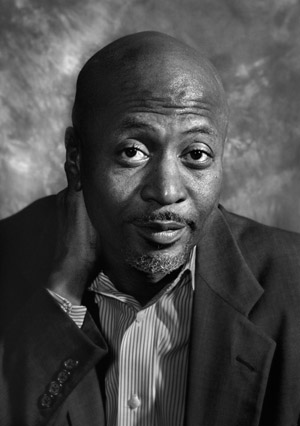JT Thompson
John Thompson was released from Louisiana’s Angola State Penitentiary in 2003 after serving 18 years—14 on death row—for a murder he did not commit. Thompson had faced down seven execution dates before evidence of prosecutorial misconduct came to light. New evidence subsequently led to a reversal of his death sentence and, ultimately, to a new trial where he was acquitted on all charges.
Inmates sentenced to death or life without parole are ineligible for what few programs prisons offer to those with release dates, such as literacy classes and GED preparation. After years of spending 23 hours a day in a 6 by 9-foot cell watching others be led off to die, exonerated prisoners are dumped on the street with a check for $10. Plagued by physical illness and depression, disconnected from their families, their job hunts stymied by the $350 price for a clean record while police files retain their “expunged” rap sheets, Louisiana’s exonerees, in a cruel irony, are not even eligible for reentry support services.
Thompson was one of the rare lucky ones. Offered a job by one of his attorneys and temporarily placed in a hotel by another, Thompson says, “The rest was up to me.” Released on a Friday, he went to work that Monday at the Center for Equal Justice on behalf of the men who remained In Angola. That very day he met the wonderful woman he would marry.
Living paycheck to paycheck, sometimes without pay, as funding fluctuated at the Center, Thompson threw himself into counseling prisoners, investigating cases and going to court. But over two years, his frustration with the criminal system and the weight of working with the men on death row grew until the day one of his clients was executed. It almost broke him.
Thompson left the Center and took three church maintenance jobs but found he could not abandon the men on death row. Thompson joined exonerees who were meeting at the Innocence Project. Then Hurricane Katrina hit. Thompson worked to track his brothers down and three more of the exonerated soon joined the group. Working at the churches and at the Innocence Project, Thompson opened a coffee shop with his wife which soon became a meeting place for those who were wrongly convicted.
With the encouragement of 2006 Petra Fellow Emily Maw, Thompson launched Resurrection After Exoneration, the first transitional housing and resource center in the country run by the exonerated for the exonerated.
Two short years since its founding, RAE has rehabilitated a building that is home to three exonerees and has partnered with local businesses, nonprofits, professionals and volunteers to provide housing, jobs and financial management courses. Participants set aside 25 percent of their paychecks and, after a year, RAE will match the savings to help them secure housing. Perhaps most important, Thompson enables the wrongly convicted to advocate for change in the criminal system, performing their oral history program and adding their voices to the national movement for criminal system reform.
The human damage is tough to repair, and sometimes impossible. Still, Thompson says, “We are in a position to get revenge on the system that destroyed our lives. We will transform our experience of freedom by empowering productive, skilled workers to be leaders for social change in post-Katrina Louisiana. That‘s all I need. It gives me peace.”
 Photo by Jenny Bagert
Photo by Jenny Bagert